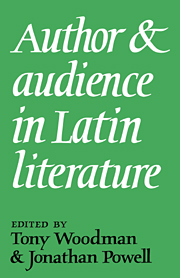Book contents
- Frontmatter
- Contents
- List of contributors
- Prologue
- 1 THE ORATOR AND THE READER: Manipulation and response in Cicero's Fifth Verrine
- 2 STRATAGEMS OF VANITY: Cicero, Ad familiares 5.12 and Pliny's letters
- 3 ‘SHALL I COMPARE THEE…?’: Catullus 68B and the limits of analogy
- 4 ATOMS AND ELEPHANTS: Lucretius 2.522–40
- 5 IN MEMORIAM GALLI: Propertius 1.21
- 6 THE POWER OF IMPLICATION: Horace's invitation to Maecenas (Odes 1.20)
- 7 THE VOICE OF VIRGIL: The pageant of Rome in Aeneid 6
- 8 FROM ORPHEUS TO ASS'S EARS: Ovid, Metamorphoses 10.1–11.193
- 9 POET AND AUDIENCE IN SENECAN TRAGEDY: Phaedra 358–430
- 10 PERSIUS' FIRST SATIRE: A re-examination
- 11 NERO'S ALIEN CAPITAL: Tacitus as paradoxographer (Annals 15.36–7)
- 12 AMOR CLERICALIS
- 13 EPILOGUE
- Notes
- Abbreviations and bibliography
- Indexes
Prologue
Published online by Cambridge University Press: 13 March 2010
- Frontmatter
- Contents
- List of contributors
- Prologue
- 1 THE ORATOR AND THE READER: Manipulation and response in Cicero's Fifth Verrine
- 2 STRATAGEMS OF VANITY: Cicero, Ad familiares 5.12 and Pliny's letters
- 3 ‘SHALL I COMPARE THEE…?’: Catullus 68B and the limits of analogy
- 4 ATOMS AND ELEPHANTS: Lucretius 2.522–40
- 5 IN MEMORIAM GALLI: Propertius 1.21
- 6 THE POWER OF IMPLICATION: Horace's invitation to Maecenas (Odes 1.20)
- 7 THE VOICE OF VIRGIL: The pageant of Rome in Aeneid 6
- 8 FROM ORPHEUS TO ASS'S EARS: Ovid, Metamorphoses 10.1–11.193
- 9 POET AND AUDIENCE IN SENECAN TRAGEDY: Phaedra 358–430
- 10 PERSIUS' FIRST SATIRE: A re-examination
- 11 NERO'S ALIEN CAPITAL: Tacitus as paradoxographer (Annals 15.36–7)
- 12 AMOR CLERICALIS
- 13 EPILOGUE
- Notes
- Abbreviations and bibliography
- Indexes
Summary
It is now almost twenty years since the publication of Quality and pleasure in Latin poetry, the first volume in what has become an occasional series. Although the present volume conforms to the general style of its three predecessors, readers will notice that there has been a change in the editorial team. The reason is that our publication is intended to honour one of the original editors, David West, who in 1992 retires from the University of Newcastle upon Tyne, where he has held the Chair of Latin since 1969.
That the theme of this book is close to David West's heart will be recognised by all those who have come into contact with him, whether as students, colleagues, readers, auditors or friends. He has devoted most of his scholarly life to explaining Latin texts – and especially those of Lucretius, Horace and Virgil, each of whom is represented here – to modern audiences which have ranged from fellow professionals to sixthformers. Indeed several generations of sixth-formers will remember with (it is hoped) affection ‘Latin Alive’, the Latin residential course which was held in Newcastle at Easter in the 1970s and to which guest Latinists were invited if they were willing, and perhaps even able, to join ‘Professor Occidens’ in playing football with the students.
Yet the title of this volume is of course disingenuous too. It evokes such modern mysteries as ‘audience-oriented criticism’ and its companion ‘reader-response criticism’; and followers of David West's career will be only too well aware of his scepticism about modern literary theory.
- Type
- Chapter
- Information
- Author and Audience in Latin Literature , pp. xiii - xivPublisher: Cambridge University PressPrint publication year: 1992

